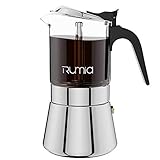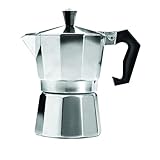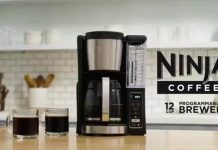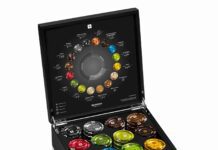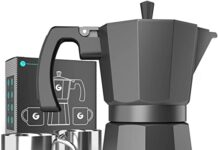When choosing a Bialetti Moka Pot, there are several factors to consider. From size options and material choices to capacity and recommendations, finding the perfect moka pot can seem overwhelming. But fear not. We’re here to guide you through the process and help you make an informed decision.
Key Takeaways:
- Consider the material: Aluminum moka pots are more affordable, while stainless steel ones are non-porous and more durable.
- Consider your stove type: Check for compatibility with electric or induction stoves before purchasing.
- Manual or electric: Manual moka pots require more control, while electric ones offer convenience.
- Size matters: Choose a moka pot size based on how much coffee you want to brew.
- Don’t forget maintenance: Proper cleaning and maintenance will ensure optimal performance and longevity.
I borrowed a Bialetti Moka Express from a coworker, and he didn’t know the Size.
I have never tried this before. I didn’t know what I was doing.
As such, I struggled to try to find a good brew.
Guide Bialetti Moka Pot Sizes
Moka coffee is much more similar to espresso, made using an espresso maker.
You may hear some favoring a Moka pot as a stovetop espresso maker.
The generated coffee has a higher extraction ratio than you get with a new espresso machine.
It is vital to note that Moka coffee is not considered an espresso edition.
The taste profiles of Moka coffee and espresso are pretty different.
The specific taste you will get from your Moka coffee will depend on a few factors.
Using it to make your Moka coffee will significantly impact your taste profile.
Things like bean type, grind standard, roast level, and water standard will impact the taste and caffeine level you experience when taking a sip.
Further, you will control much of what the end item looks and tastes like based on how you maintain heat levels during brewing.
What does the Moka pot size mean?
It is vital to know that we are not discussing traditional “cup” measurements for the Moka pot.
The number of “cups” your Moka pot can generate represents the number of fifty-milliliter expresso-sized cups that can be produced.
One Moka cup equals about two fluid ounces in American measurements. Bear in mind that the correct measures can change.
Anyway, let’s take a look at the standard chart for a Moka pot:
- One cup will equal two fluid ounces.
- Three cups will equal 6.5 fluid ounces.
- Six cups will equal ten fluid ounces.
- Nine cups will equal 18.5 fluid ounces.
- Twelve cups will equal 25 fluid ounces.
Read Next – Best Espresso Maker Moka Pot Our Top Picks
It went like this:
-
For the first brew, I treated it like a single-cup brewer. As a result, the coffee was burnt, bitter, and smelled like a wet newspaper.
-
I treated it like a three-cup brewer for the second brewer, but it still came out too strong.
-
I made variable changes for the third brew, treating it like a three-cup brewer, but the mixture was much too bitter for my taste.
Read Next – Nespresso Vertuoline Third-Party Capsules
Bialetti Moka pot sizes: Coffee
Then I started looking online for help, and after finding some dimensions online, I realized that I have a SIX CUP brewer, and everything made sense.
The coffee was so much better on my fourth brew, treating it like it should be. It was a world of difference.
So, here is a listing of Bialetti Moka Express heights for future reference.
Hopefully, this will be of benefit to someone else who isn’t sure of the capacity of their Bialetti Moka express, such as those who inherited or borrowed them:

Read Next – Best Bialetti Stovetop Espresso Maker
Size guide
The Bialetti Moka Express comes in various sizes – each cup corresponds roughly to a ~30-50ml concentrated shot, and most people like doubles. Many people will dilute the concentrate for an Americano-style coffee to make a longer drink.
When choosing your size, please remember that the Bialetti stovetop will not work well when partially complete, so pick a size you’ll be happy to fill each time.
Many people will have a larger one for groups and a smaller one for solo cups of delicious coffee.
Read Next – bonVIVO Intenca Copper Stovetop Espresso Maker
CHOOSING THE RIGHT MOKA POT BY SIZE
Here are our recommendations in terms of the number of people being brewed for:
| Cups | Capacity (ml / fl. oz.) | Height (cm. / in.) |
|---|---|---|
| 1 | 60 mL / 2 fl. oz. | 13 cm. / 5 in. |
| 3 | 200 mL / 6.5 fl. oz. | 16 cm. / 6 in. |
| 6 | 300 mL / 10 fl. oz | 22 cm. / 8.5 in. |
| 9 | 550 mL / 18.5 fl. oz | 25 cm. / 10 in. |
| 12 | 775 mL / 25 fl. oz | 29 cm. / 11.5 in. |
Walk into an Italian home, and you’ll likely spot one of these distinctive octagonal contraptions.
For over eight decades, coffee lovers in Italy and worldwide have used the Bialetti Moka Express to make fantastic espresso-style coffee quickly.
All you need to do is fill the bottom with water, fill the filter basket with freshly ground coffee, and put your Moka Express (or Moka pot as some people call it) on the stove, and within minutes, you will have a rich and delicious coffee. Read below for more detailed instructions.
Read Next – Bialetti Moka Express Aluminium Stovetop Coffee Maker Review
How to make a coffee with the Bialetti Moka Express
- Grind your coffee to a medium-fine grind (slightly coarser than espresso)
- Fill the bottom chamber with water up to the valve. This water should be hot to avoid the coffee sitting on the stove too long, but cold water works, too!
- Place your ground coffee in the filter basket and level off. It should be complete, but do not tamp the coffee down – you want it loosely packed.
- Place the filter basket in the bottom chamber with the water and screw on the top (don’t use the plastic handle for leverage).
- Place the Moka Express on the stove on medium heat.
- Watch or listen for the coffee to start coming out (you can lift the top)
- Once the coffee turns light in color or you start hearing gurgling, immediately take the Moka Express off the heat. The trick is to catch it before you overheat the coffee.
- Pour immediately!
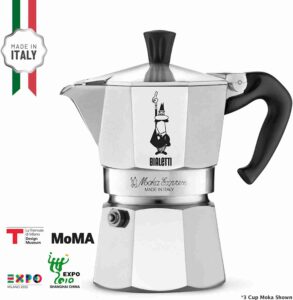
Product Features
- It makes a concentrated, rich espresso-style coffee
- Made of highly durable aluminum – they have been known to last a lifetime.
- Easy to clean – rinse & wipe and allow to dry
- Suitable for gas or electric stoves
- Great for camping
Are you planning to purchase a Moka pot for yourself, but are you confused about the different sizes available? Do not worry; here is a complete guide to Bialetti Moka pot sizes to tell you everything about Moka pot sizes.
Although the perfect Size of a Moka pot depends on how much and in which style you like to drink your coffee.
The Bialetti Moka pot sizes guide shows that in case an 8oz. A mug or double espresso is sufficient for you, so a 90ml (2 cups) Moka pot will be a decent size. For people who need or want more, a 130ml (3 cups) Moka pot is more suitable for you.
Are you wondering how we got to that decision and how you can customize your Moka pot size according to your situation and needs? Keep reading this Bialetti Moka pot measures guide to know the details below…
Read Next – Best Dolce Gusto Coffee Maker For You
How Much Coffee Does The Moka Pot Able To Make?
The Size of the Moka does not essentially mean precisely how much coffee you are going to acquire after the completion of brewing. In the end, the amount of coffee depends on some factors. The factors are as follows…
- Amount of ground coffee
- Amount of the water you begin with
- Roast of grounds
- Grind Size of the grounds
However, those things are based on the individual brewing the coffee and do not change the actual Moka pot size. The sizes in milliliters are precisely what you’ll get under usual circumstances, so it is a decent Bialetti Moka pot sizes guide to follow while purchasing a Moka pot.
Bialetti Moka Pot Sizes Guide: What Size Should You Buy?
The response to this question entirely depends on your precise requirements. In simple words, you need 1 cup of coffee per serving.
However, beyond that, this will get a little bit more complex. Selecting the Bialetti Moka pot’s accurate Size can help save you from trouble and precious storage space on your countertop.
Keep reading this Bialetti Moka pot sizes guide to see our top references for the most suitable Moka pot sizes for you and your family.
Read Next – Best IMUSA Aluminum Espresso Stovetop For You
The 1-cup Moka Pot Size
This 1-cup Moka pot size is a single-serving container. So, if you live alone, go for the 1-cup Size Moka pot. This will be enough to get your fast Java fix every morning before stepping out.
A 1-cup size Moka pot delivers the amount of 2 fluid ounces of coffee. That equals the amount you would get from a standard shot glass. Committing to this 1-cup Moka pot suggests that you do not like to sit and sip numerous cups of coffee on a lazy morning while reading the newspaper.
ADVANTAGES
- Quick brew
- Efficient
- Sufficient for one person searching for a shot of brew
DISADVANTAGES
- No chance to increase the output when you have visitors
- Complete preparation is required for just a tiny output
- No chance for a “second cup of coffee” without resuming the procedure
Bialetti - Moka Express: Iconic Stovetop Espresso Maker, Moka Pot 1 Cup (2 Oz - 60 Ml), Aluminium, Silver
7 used from $23.28
Primula Stovetop Espresso and Coffee Maker, Moka Pot for Classic Italian and Cuban Café Brewing, Cafetera, One Cup, Silver
Bialetti Moka Express 1-Cup (2 Oz - 60 Ml) Aluminum Stovetop Espresso Maker, Silver
4 used from $24.54
The 3-cup Moka Pot Size
That is primarily factual if you enjoy more than one serving of coffee. Several people get their best suit in this 3-cup Moka pot size. This is still a solid choice for somebody searching for a single-serving pot.
This 3-cup Moka pot size is suitable for a couple searching for something that can make some fresh serving of coffee early in the morning. Nevertheless, a 3-cup size Moka pot will not be sufficient for two people if they want a second cup of coffee! Remember that this 3-cup Size Moka pot only offers up to 6.5 fluid ounces of brew.
ADVANTAGES
- Relatively easy to store in your kitchen
- Offers the chance for a 2nd serving.
- It’s still comparatively quick to brew.
DISADVANTAGES
- Not reasonably sufficient to share with a group of people
- Not enough for 2 “heavy” coffee lovers
Bialetti - Moka Express: Iconic Stovetop Espresso Maker, Makes Real Italian Coffee, Moka Pot 3 Cups (4.3 Oz - 130 Ml), Aluminium, Silver
Primula Stovetop Espresso and Coffee Maker, Moka Pot for Classic Italian and Cuban Café Brewing, Cafetera, Three Cup
$14.99 in stock
The 6-cup Moka Pot Size
This 6-cup Moka pot size delivers ten fluid ounces of coffee. We’re now getting an output equal to what’s offered by the “conventional” coffee machine with which so many individuals start their daily mornings.
The 6-cup Moka pot size can be ideal for a pair of roommates or couples searching for a method to make good, high-quality coffees for 2 in the morning.
ADVANTAGES
- Suitable for 2nd cup of coffee
- Perfect when you are sharing a cup of coffee with a partner
- Delivers more cups of coffee than a “regular” cup of coffee.
DISADVANTAGES
- Hard to store
- The result is insufficient for a party or “crowd” without numerous batches.
- It needs more coffee grounds.
Bialetti - Moka Express: Iconic Stovetop Espresso Maker, Makes Real Italian Coffee, Moka Pot 6 Cups (9 Oz - 270 Ml) , Aluminium, Silver
11 used from $19.99
Primula Stovetop Espresso and Coffee Maker, Moka Pot for Classic Italian and Cuban Café Brewing, Cafetera, Six Cup
Bialetti Moka Express Aluminum 6 Cup Stove-top Espresso Maker with Replacement Filter and Gaskets
Bialetti Moka Express 6 Cup, 1 EA, silver, 6800
$39.95 in stock
9 used from $29.52
The 9-Cup Moka Pot Size
A 9-cup Moka pot size that brews up to 18.5 fluid ounces of coffee will get you way closer to what you would get with a slighter “conventional” drip coffee machine. It can be a decent option if you live with more than a few coffee drinkers.
ADVANTAGES
- Efficient
- Can serve 3 to 4 coffee drinkers comparatively well
- Suitable for maximum families out there
DISADVANTAGES
- Hard to store
- It will be slightly heavier to use as compared to the smaller options.
- It takes a little more time to heat
- It needs even more coffee grounds
Bialetti - Moka Express: Iconic Stovetop Espresso Maker, Makes Real Italian Coffee, Moka Pot 9 Cups (14 Oz - 420 Ml), Aluminium, Silver
Bialetti - Moka Express: Iconic Stovetop Espresso Maker, Makes Real Italian Coffee, Moka Pot 9 Cups (14 Oz - 420 Ml), Aluminium, Silver
5 used from $37.99
The 12-cup Moka Pot Size
The 12-cup Moka pot size will not be the natural choice for all and sundry. Nevertheless, this can be a good choice if you live with a massive family with numerous individuals who love to start their day with coffee. The 12-cup Moka pot will make around 25 fluid ounces of coffee per brew.
This 12-cup Moka pot’s output is coarsely more than 3 EIGHT-ounce cups of “conventional” coffee. The Moka cups are way smaller than the conventional ones, which means you get up to 12 servings of coffee as soon as you brew this to its total capacity.
ADVANTAGES
- Great for parties and crowd
- Brews numerous servings
- Perfect for a more prominent family
DISADVANTAGES
- It needs more space for storage
- Weightier to hold
- Excess for the maximum number of people
Primula Stovetop Espresso and Coffee Maker, Moka Pot for Classic Italian and Cuban Café Brewing, Cafetera, Twelve Cup
9 used from $23.98
Bialetti - Moka Express: Iconic Stovetop Espresso Maker, Makes Real Italian Coffee, Moka Pot 12 Cups (22 Oz - 670 Ml), Aluminium, Silver
3 used from $43.87
Bialetti - Moka Express: Iconic Stovetop Espresso Maker, Makes Real Italian Coffee, Moka Pot 12 Cups (22 Oz - 670 Ml), Aluminium, Silver
5 used from $51.44
Aluminum vs. Stainless Steel Moka Pots
There are some key differences when choosing between aluminum and stainless steel moka pots. Aluminum moka pots are typically more affordable than stainless steel ones, making them a popular choice for budget-conscious coffee lovers. However, it’s important to note that aluminum is a porous material, which means it can absorb and retain flavors over time. This can lead to a build-up of coffee residue and affect the taste of your brew. To avoid this, aluminum moka pots should be cleaned with hot water only, avoiding using soap or abrasive materials that could impact the flavor.
On the other hand, stainless steel moka pots offer several advantages. Styl steel is a non-porous material that won’t absorb flavors or odors. This makes it easier to clean and maintain, as you can use soap and water without worrying about affecting the taste of your coffee. Additionally, stainless steel moka pots are more durable and long-lasting than aluminum ones. While they may come at a higher price point, their quality and longevity make them a worthwhile investment for coffee enthusiasts who value quality and performance.
Choosing between aluminum and stainless steel moka pots ultimately comes down to personal preference and budget. Aluminum pots are a practical option for those on a budget, while stainless steel pots offer superior durability and flavor retention. Whichever material you choose, proper cleaning and maintenance are essential to ensure the longevity and performance of your moka pot.
Comparison of Aluminum and Stainless Steel Moka Pots:
| Aspect | Aluminum Moka Pots | Stainless Steel Moka Pots |
|---|---|---|
| Material | Aluminum | Stainless Steel |
| Price | Affordable | Higher cost |
| Flavor Impact | Porous material can impact flavor over time | Non-porous material retains its original flavor |
| Cleaning | Hot water only. Avoid soap Avoid abrasive materials |
Soap and water can be used Easier to clean and maintain |
| Durability | Less durable compared to stainless steel | More durable and long-lasting |
As you can see, aluminum and stainless steel moka pots have advantages and considerations. Whether you prioritize affordability or durability, choosing a moka pot that suits your needs and brewing preferences is essential. You can enjoy delicious stovetop espresso for years with the proper care and maintenance.
Bialetti - Moka Express: Iconic Stovetop Espresso Maker, Moka Pot 1 Cup (2 Oz - 60 Ml), Aluminium, Silver
7 used from $23.28
Primula Stovetop Espresso and Coffee Maker, Moka Pot for Classic Italian and Cuban Café Brewing, Cafetera, One Cup, Silver
Bialetti Moka Express 1-Cup (2 Oz - 60 Ml) Aluminum Stovetop Espresso Maker, Silver
4 used from $24.54
Compatibility with Different Stove Types
When choosing a moka pot, it’s essential to consider its compatibility with different stove types. Not all moka pots are suitable for electric or induction stoves, so it’s crucial to double-check before making a purchase. Most aluminum moka pots are not designed for electric or induction stoves. Their construction and material may not withstand the heat generated by these stoves, which can lead to damage or even safety hazards.
On the other hand, stainless steel moka pots are specifically designed for compatibility with electric and induction stoves. These moka pots are constructed with materials that can handle the heat generated by these stoves, ensuring safe and efficient brewing. Suppose you have an electric or induction stove and want to use a moka pot. In that case, choosing a stainless steel option explicitly labeled as suitable for electric or induction stoves is recommended.
The Bialetti Venus Stainless Steel Induction Moka Pot
One excellent option for those with induction stoves is the Bialetti Venus Stainless Steel Induction Moka Pot. This Moka pot is designed for compatibility with induction stoves, ensuring you can enjoy delicious stovetop espresso without any compatibility issues. It features a sleek stainless steel construction that is durable and easy to clean, making it a convenient choice for any coffee lover.
| Moka Pot | Compatibility |
|---|---|
| Bialetti Venus Stainless Steel | Induction Stove |
| Bialetti Moka Express | Electric Stove |
Remember, before purchasing a Moka pot, it’s essential to check its compatibility with your stove type. This will ensure you can enjoy the perfect cup of stovetop espresso without any inconvenience.
Manual vs. Electric Moka Pots
When choosing a moka pot, one of the critical decisions is whether to go for a manual or an electric option. Both types have pros and cons, so let’s look at each.
Manual Moka Pots
Manual moka pots, also known as stovetop moka pots, require more skill and control to use effectively. You must carefully manage the temperature and grind size for the perfect brew. But the effort is worth it for those who enjoy the hands-on brewing process and want complete control over their coffee.
Pros of Manual Moka Pots:
- More affordable than electric moka pots
- Allows for greater control over brewing variables
- Provides a traditional brewing experience
Cons of Manual Moka Pots:
- Requires more effort and monitoring during brewing
- Temperature and grind size need to be carefully managed
- It may take some practice to master the brewing technique
Electric Moka Pots
Electric moka pots, on the other hand, offer convenience and ease of use. These moka pots come with temperature regulators; some even have timers, making the brewing process more straightforward. If you value simplicity and consistency in your coffee brewing routine, an electric moka pot may be the right choice.
Pros of Electric Moka Pots:
- It is easier to use and requires less effort
- Consistent brewing results
- Some models feature temperature control and timers
Cons of Electric Moka Pots:
- Generally more expensive than manual moka pots
- Less control over brewing variables
- It may require an electrical outlet for operation
Whether you prefer the hands-on approach of manual moka pots or the convenience of electric ones, both options can deliver delicious coffee. It ultimately comes down to your personal preferences and brewing style.
Table: Pros and Cons of Manual and Electric Moka Pots
| Manual Moka Pots | Electric Moka Pots |
|---|---|
| Pros | Pros |
|
|
| Cons | Cons |
|
|
Choosing the Right Size
When choosing the right size for your Bialetti Moka Pot, you must consider how much coffee you want. Each “cup” of a moka pot equals about 2 fluid ounces of stovetop espresso. So, if you’re a solo coffee lover who enjoys a single cup in the morning, a smaller size, such as a 1-cup or 3-cup moka pot, may be perfect. However, if you often entertain guests or have a household of coffee enthusiasts, you may want to go for a larger size, such as a 6-cup or 9-cup moka pot.
It’s also worth noting that moka pots are great for making concentrated coffee that can be diluted to taste. So, if you prefer a more potent brew that you can mix with hot water, milk, or other ingredients, a smaller moka pot may still be sufficient. On the other hand, if you enjoy larger servings of stovetop espresso or want to make multiple drinks at once, a larger moka pot will be more suitable.
When choosing the size, considering your future needs is always a good idea. If you anticipate your coffee consumption changing or want the flexibility to make varying amounts of coffee, you may opt for a moka pot that can accommodate different cup sizes. This way, you’ll have the versatility to brew just the right amount of coffee for any occasion.
| Moka Pot Size | Number of “Cups” | Approximate Brew Size (Fluid Ounces) |
|---|---|---|
| 1-Cup | 1 | 2 |
| 3-Cup | 3 | 6 |
| 6-Cup | 6 | 12 |
| 9-Cup | 9 | 18 |
The Versatility of Moka Pots
Moka pots are not only great for brewing stovetop espresso, but they also offer a wide range of uses and possibilities. Their versatility makes them a valuable tool for any coffee lover. Here are some of the ways you can get creative with your moka pot:
1. Moka Pot Coffee Cocktails
With a moka pot, you can create delicious coffee cocktails that will impress your guests or elevate your coffee experience. From classic coffee martinis to creamy espresso-based drinks, the moka pot is the perfect base for experimenting with different flavors and combinations. Let your imagination run wild and discover new coffee cocktail recipes to enjoy.
2. Moka Pot Coffee Variations
While the classic stovetop espresso is delicious, you can also use your moka pot to create different coffee variations. Add steamed milk for a creamy cappuccino or a velvety latte. If you prefer a more robust flavor, try making an Americano by diluting the espresso with hot water. The possibilities are endless, allowing you to tailor your coffee to suit your taste preferences.
“The versatility of moka pots allows coffee lovers to experiment with different flavors and create unique coffee experiences.”
In addition to these creative options, moka pots can be used for brewing tea or infusing fruits and herbs into water for refreshing flavored beverages. The versatility of moka pots allows coffee lovers to experiment with different flavors and create unique coffee experiences.
| Moka Pot Use | Ideas |
|---|---|
| Coffee Cocktails | Classic coffee martinis, flavored coffee cocktails, and creative coffee-based mixed drinks. |
| Coffee Variations | Cappuccinos, lattes, Americanos, customized coffee creations. |
| Infused Beverages | Herbal tea, fruit-infused water, flavored hot drinks. |
Using Freshly Roasted, Specialty-Grade Beans
When it comes to brewing coffee in a moka pot, the quality of the coffee beans you use can make a significant difference in the flavor of your brew. Using freshly roasted, specialty-grade beans will elevate your moka pot experience and result in a more satisfying cup of coffee. Specialty-grade beans are known for their superior quality and unique flavors, making them the ideal choice for brewing in a moka pot.
Specialty-grade coffee beans undergo rigorous quality control measures and are sourced from specific regions known for producing exceptional coffee. These beans are meticulously roasted to bring out their nuanced flavors and aromas. By using specialty-grade beans in your moka pot, you can expect a more complex and flavorful cup of coffee that showcases the characteristics of the specific bean origin.
The impact of coffee bean quality on the moka pot brew is undeniable. Freshly roasted beans retain their natural flavors and oils, which are extracted during brewing. The result is a rich, aromatic cup of stovetop espresso that is full-bodied and smooth. Additionally, the beans’ freshness ensures optimal extraction, allowing you to enjoy the true essence of the coffee.
Benefits of Using Freshly Roasted, Specialty-Grade Beans in a Moka Pot
- Enhanced flavor profile: Specialty-grade beans offer a wide range of flavors, including fruity, chocolaty, nutty, floral, and more. These flavors are intensified when brewed in a moka pot, creating a truly exceptional cup of coffee.
- Greater control over brewing variables: Freshly roasted beans provide more control over variables such as grind size and extraction time, allowing you to fine-tune your brewing process and achieve the desired flavor profile.
- Enjoy the essence of the coffee: Specialty-grade beans have unique characteristics that can be fully appreciated in a moka pot. Their delicate nuances and subtle notes are preserved, creating a more nuanced and enjoyable coffee experience.
Using freshly roasted, specialty-grade beans in your moka pot, you can elevate your coffee brewing and enjoy a remarkable cup of stovetop espresso. The combination of high-quality beans and the unique brewing method of the moka pot will awaken your senses and provide a delightful coffee experience.
| Benefits of Using Freshly Roasted, Specialty-Grade Beans |
|---|
| Enhanced flavor profile |
| Greater control over brewing variables |
| Enjoy the true essence of the coffee |
Brew Guide for Moka Pot
Are you ready to become a master of moka pot brewing? We’ve got you covered with our comprehensive brew guide. Follow these step-by-step instructions and handy tips to achieve the perfect cup of stovetop espresso.
Step 1: Prepare
Start by gathering your materials. You will need freshly roasted coffee beans, a moka pot, water, a grinder, a scale, and a medium-sized heat source. Measure out the desired amount of coffee beans, typically one tablespoon per “cup” of the moka pot.
Step 2: Grind & Fill
Grind the coffee beans to a medium-fine consistency, similar to table salt. Fill the bottom chamber of the moka pot with fresh, cold water up to the valve or just below it. Insert the funnel and fill it with the ground coffee, leveling it off without packing it too tightly.
Step 3: Assemble & Brew
Screw the top chamber onto the bottom chamber, ensuring a tight seal. Place the moka pot on a medium heat source and open the lid. As the water heats up, the pressure will push the brewed coffee through the funnel and into the top chamber. Once you hear a hissing sound and see the brewed coffee filling the top chamber, remove the moka pot from the heat.
Step 4: Enjoy!
Give the moka pot a few minutes to cool down before pouring the coffee into your favorite cup. Enjoy the stovetop espresso or mix it with hot water for an Americano. Add steamed milk for a creamy latte, or get creative with your coffee cocktails. The possibilities are endless!
Remember, practice makes perfect. Don’t be discouraged if your first few attempts don’t meet your expectations. Adjust the grind size, water level, and heat intensity until you find the sweet spot for your taste preferences. With time, you’ll become a moka pot brewing expert!
| Step | Instructions |
|---|---|
| Step 1 | Gather materials and measure coffee beans |
| Step 2 | Grind coffee beans and fill the moka pot |
| Step 3 | Assemble the moka pot and brew on medium heat |
| Step 4 | Allow the moka pot to cool down, and enjoy your coffee |
Bialetti - Moka Express: Iconic Stovetop Espresso Maker, Makes Real Italian Coffee, Moka Pot 3 Cups (4.3 Oz - 130 Ml), Aluminium, Silver
Primula Stovetop Espresso and Coffee Maker, Moka Pot for Classic Italian and Cuban Café Brewing, Cafetera, Three Cup
$14.99 in stock
Cleaning and Maintenance
Proper cleaning and maintenance are essential for keeping your moka pot in top condition and always ensuring a delicious cup of coffee. Whether you have an aluminum or stainless steel moka pot, here are some tips to keep it clean and well-maintained:
- After each use, disassemble the moka pot and rinse all the parts with hot water. This will help remove any coffee residue and prevent it from impacting the flavor of future brews.
- For aluminum moka pots, avoid using soap or abrasive surfaces during cleaning, as they can leave behind a residue that affects the taste of your coffee. Instead, use a soft cloth or sponge to wipe the interior and exterior of the pot.
- Stainless steel moka pots are more resilient and can be cleaned with soap and water. You can also use a non-abrasive sponge to remove stubborn stains or build-up.
- Regularly inspect the rubber gasket and replace it if it shows wear or damage. A good seal is crucial for proper functioning and optimal coffee extraction.
- Store your moka pot in a cool, dry place to prevent moisture or odors from affecting the coffee’s flavor. Avoid stacking other items on the pot to prevent any dents or damage.
Following these simple cleaning and maintenance practices ensures that your moka pot stays in great shape and brews delicious coffee for years.
“Taking care of your moka pot is just as important as the brewing process itself. A well-maintained moka pot not only enhances the taste of your coffee but also prolongs its lifespan. So, make it a habit to clean your moka pot after each use and store it properly. By doing so, you’ll always have a reliable companion for your daily coffee ritual.”
Cleaning and maintaining your Moka pot is crucial for optimal brewing performance. Whether you have an aluminum or stainless steel moka pot, ensure you clean it thoroughly after each use, avoid using soap or abrasive materials for aluminum pots, inspect and replace the rubber gasket if necessary, and store it in a dry place. Following these care instructions will help you enjoy delicious coffee from your moka pot for years.
Bialetti - Moka Express: Iconic Stovetop Espresso Maker, Makes Real Italian Coffee, Moka Pot 6 Cups (9 Oz - 270 Ml) , Aluminium, Silver
11 used from $19.99
Primula Stovetop Espresso and Coffee Maker, Moka Pot for Classic Italian and Cuban Café Brewing, Cafetera, Six Cup
Bialetti Moka Express Aluminum 6 Cup Stove-top Espresso Maker with Replacement Filter and Gaskets
Bialetti Moka Express 6 Cup, 1 EA, silver, 6800
$39.95 in stock
9 used from $29.52
Conclusion
After carefully considering the various factors in choosing a Bialetti Moka Pot, we have reached the end of our comprehensive guide. We hope this information has helped you make the right decision for your coffee brewing needs.
Regarding material, aluminum, and stainless steel are the two main options. Aluminum moka pots are more affordable, but they can impact the coffee’s flavor over time. On the other hand, stainless steel moka pots are non-porous, easier to clean, and more durable.
Deciding between a manual or electric moka pot is another critical consideration. Manual moka pots require more control and skill, while electric moka pots offer convenience. It ultimately depends on your personal preferences and budget.
Lastly, the size of the moka pot will determine how much coffee it can brew. Each “cup” of a moka pot equals about 2 fluid ounces of stovetop espresso. Choosing a size that aligns with your desired brewing volume is essential to ensure the best flavor and performance.
In conclusion, we hope that our Bialetti Moka Pot Sizes Guide has given you the knowledge and confidence to make an informed decision. Remember to use freshly roasted, specialty-grade beans and to properly clean and maintain your moka pot for optimal brewing results. Cheers to a delicious cup of stovetop espresso!
In the end, the size of the Moka pot depends on your needs and preferences.
No matter which kind of Moka pot suits your tastes and needs better, we hope this Bialetti Moka pot sizes guide has assisted you in getting some key points regarding these pleasant little machines.
Have a great day, and good luck with brewing!
Read Next – Bialetti Moka Express Hob Espresso Maker 6 Cup
Primula Stovetop Espresso and Coffee Maker, Moka Pot for Classic Italian and Cuban Café Brewing, Cafetera, Twelve Cup
9 used from $23.98
Bialetti - Moka Express: Iconic Stovetop Espresso Maker, Makes Real Italian Coffee, Moka Pot 12 Cups (22 Oz - 670 Ml), Aluminium, Silver
3 used from $43.87
Bialetti - Moka Express: Iconic Stovetop Espresso Maker, Makes Real Italian Coffee, Moka Pot 12 Cups (22 Oz - 670 Ml), Aluminium, Silver
5 used from $51.44
Impact the coffee’s flavors between aluminum and stainless steel moka pots?
Aluminum moka pots are more affordable but can impact the flavor of the coffee over time due to their porous nature. Stainless steel moka pots, on the other hand, are non-porous, easier to clean, and more durable.
Can all Moka pots be used on electric or induction stoves?
No, not all Moka pots are compatible with electric or induction stoves. It’s important to double-check the compatibility of the Moka pot you are considering before purchasing.
What are choosing moka pots compared to electric ones?
Manual moka pois essential ts are more affordable, while electric ones are more convenient as they have temperature regulators and timers.
How much coffee can a moka pot brew?
The size of the moka pot will determine how much coffee it can brew. Each “cup” of a moka pot contains two fluid ounces of stovetop espresso.
Bialetti - Moka Express: Iconic Stovetop Espresso Maker, Makes Real Italian Coffee, Moka Pot 9 Cups (14 Oz - 420 Ml), Aluminium, Silver
Bialetti - Moka Express: Iconic Stovetop Espresso Maker, Makes Real Italian Coffee, Moka Pot 9 Cups (14 Oz - 420 Ml), Aluminium, Silver
5 used from $37.99
What can I make with a moka pot?
Moka pots can make stovetop espresso, Americanos, cappuccinos, lattes, and coffee cocktails.
How does the quality of the coffee beans affect the taste in a moka pot?
Using freshly roasted, specialty-grade beans will produce a superior taste compared to stale or low-grade beans.
What is the recommended brewing process for a moka pot?
It’s essential to weigh the coffee beans, grind them to a medium-fine consistency, fill the basket with the correct amount of coffee, and brew on a medium heat setting.
How should I clean and maintain my moka pot?
Aluminum moka pots should be rinsed with hot water and wiped with a rag, while stainless steel moka pots can be washed with soap and water. Regular cleaning is recommended to prevent buildup and preserve the flavors of the coffee.
Q: What is the Bialetti Moka Pot Sizes Guide?
A: The Bialetti Moka Pot Sizes Guide is a comprehensive guide that helps you understand the different sizes available for Bialetti Moka Pots and choose the right size for your needs.
Q: Does the size of the moka pot matter?
A: Yes, the size of the moka pot does matter. It determines the amount of coffee you can brew at once and the strength of the coffee.
Q: What is a 3-cup moka pot?
A: A 3-cup moka pot refers to a moka pot that can brew approximately three espresso cups of coffee. The cup size is small, usually around 2-3 ounces.
Q: How do I choose the right size moka pot?
A: To choose the right size moka pot, consider the number of people you serve coffee to and how much coffee each person drinks. Suppose you are the only coffee drinker. A three or 6-cup Moka produces insufficient. You may opt for a size for larger households or if you entertain guests frequently.
Q: What is a 9-cup moka pot?
A: A 9-cup moka pot can produce up to 9 espresso cups of coffee. The cup size is small, usually around 2-3 ounces.
Q: What is the best moka pot size?
A: The best moka pot size depends on preferences and needs. If you are eating multiple cups of coffee or have a household of coffee drinkers, a larger moka pot, such as a nine or 12-cup size, may be ideal. If you prefer smaller servings or only need coffee, a 3 or 6-cup size may be more suitable.
Q: What are the different sizes of moka pots available?
A: Bialetti offers a range of moka pot sizes, including 1-cup, 3-cup, 6-cup, 9-cup, and 12-cup options. These sizes refer to the number of espresso cups the moka pot can brew.
Q: How much coffee do I need for a Moka pot?
A: The amount of coffee you need for a moka pot depends on the size of the moka pot and your taste preferences. As a general guideline, you can use approximately 1 tablespoon of ground coffee per espresso cup. Adjust the amount according to your desired strength of coffee.
Q: Does the moka pot size affect the strength of the coffee?
A: Yes, the moka pot size can affect the strength of the coffee. A larger moka pot will produce more coffee and may be less concentrated than a smaller moka pot. However, you can constantly adjust the amount of coffee grounds to achieve your desired strength.
Q: What is the optimal cup size to produce a pot?
A: The optimal cup size moka pot is typically a tiny espresso cup, around 2-3 ounces. This allows you to enjoy the solid and concentrated flavors of the moka pot coffee.
Bialetti - Moka Express: Iconic Stovetop Espresso Maker, Makes Real Italian Coffee, Moka Pot 3 Cups (4.3 Oz - 130 Ml), Aluminium, Silver
Bialetti - Moka Express: Iconic Stovetop Espresso Maker, Makes Real Italian Coffee, Moka Pot 9 Cups (14 Oz - 420 Ml), Aluminium, Silver
Bialetti - New Brikka, Moka Pot, the Only Stovetop Coffee Maker Capable of Producing a Crema-Rich Espresso, 4 Cups (5,7 Oz), Aluminum and Black
8 used from $49.03
Bialetti - New Venus Induction, Stovetop Coffee Maker, Suitable for all Types of Hobs, 18/10 Steel, 4 Cups (5.7 Oz), Aluminum, Silver
Bialetti - Moka Express: Iconic Stovetop Espresso Maker, Makes Real Italian Coffee, Moka Pot 6 Cups (9 Oz - 270 Ml) , Aluminium, Silver
11 used from $19.99
Primula Stovetop Espresso and Coffee Maker, Moka Pot for Classic Italian and Cuban Café Brewing, Cafetera, Six Cup
Bialetti Mini Express Magritte, Coffee Maker + 2 Shot Glasses, 2, Light Blue
Moka Pot - Rumia Stovetop Espresso Maker, Crystal Glass & Stainless Steel Moka Pot, 6 Espresso Cup/240 ml/8.5 oz for Strong Coffee Maker, Dishwasher Safe, Classic Percolator Italian Style
Bialetti Moka Express Aluminum 6 Cup Stove-top Espresso Maker with Replacement Filter and Gaskets
Bialetti - Moka Express: Iconic Stovetop Espresso Maker, Moka Pot 1 Cup (2 Oz - 60 Ml), Aluminium, Silver
7 used from $23.28
Primula Stovetop Espresso and Coffee Maker, Moka Pot for Classic Italian and Cuban Café Brewing, Cafetera, One Cup, Silver
Bialetti Moka Express 1-Cup (2 Oz - 60 Ml) Aluminum Stovetop Espresso Maker, Silver
4 used from $24.54
Primula Stovetop Espresso and Coffee Maker, Moka Pot for Classic Italian and Cuban Café Brewing, Cafetera, Three Cup
$14.99 in stock
Bialetti Moka Express 6 Cup, 1 EA, silver, 6800
$39.95 in stock
9 used from $29.52
Bialetti - Moka Express: Iconic Stovetop Espresso Maker, Makes Real Italian Coffee, Moka Pot 9 Cups (14 Oz - 420 Ml), Aluminium, Silver
5 used from $37.99
Primula Stovetop Espresso and Coffee Maker, Moka Pot for Classic Italian and Cuban Café Brewing, Cafetera, Twelve Cup
9 used from $23.98
Bialetti - Moka Express: Iconic Stovetop Espresso Maker, Makes Real Italian Coffee, Moka Pot 12 Cups (22 Oz - 670 Ml), Aluminium, Silver
3 used from $43.87
Bialetti - Moka Express: Iconic Stovetop Espresso Maker, Makes Real Italian Coffee, Moka Pot 12 Cups (22 Oz - 670 Ml), Aluminium, Silver
5 used from $51.44
Source Links
- https://www.javapresse.com/blogs/stovetop-brewing/pick-the-perfect-moka-pot
- https://www.reddit.com/r/Coffee/comments/jqz3ob/moka_pot_master_guide/
- https://www.coffeeness.de/en/moka-pot/











